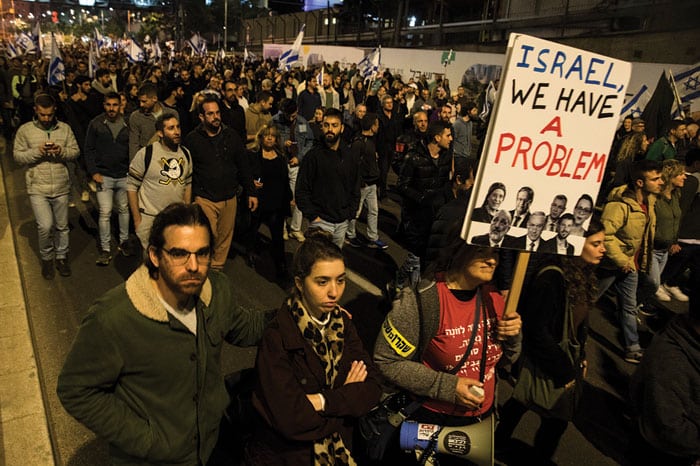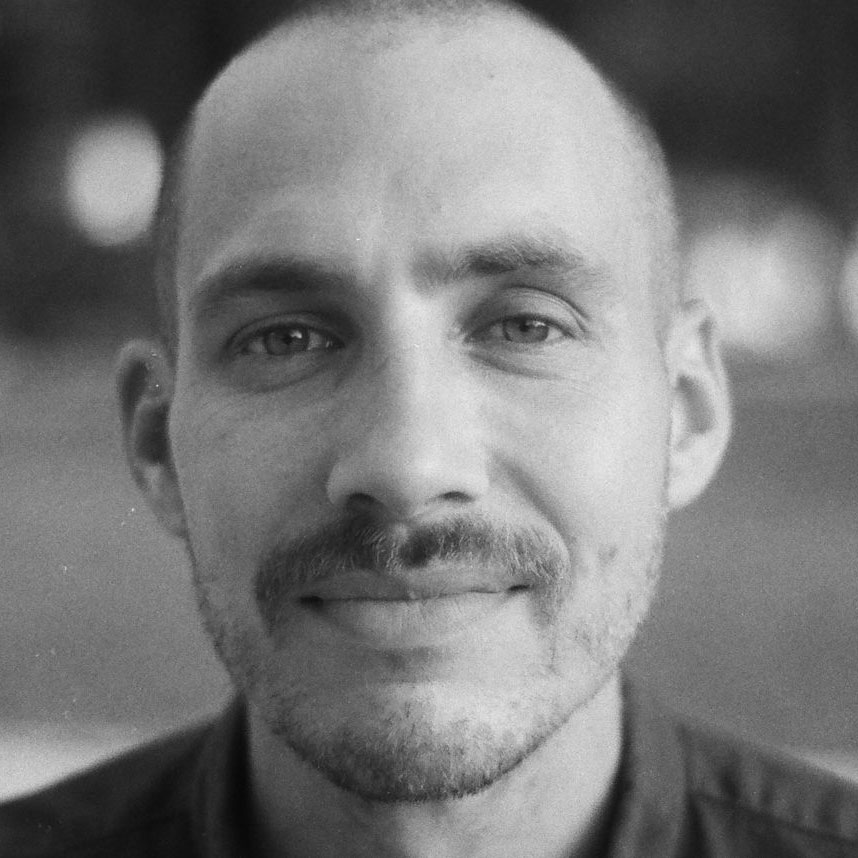 Amir Levy/Getty Images
Amir Levy/Getty Images The end is near.
According to former Israeli prime minister Ehud Barak, Israel is “hours away” from becoming a dictatorship.
In Ynet, Dr. Doron Matza warns that a “third exile” is upon us.
In Haaretz, Daniel Gordis asks if it’s “too late” to save Israel. His answer: “Probably not yet, but we are getting close.”
In the streets, a determined protest movement is declaring that it is zero hour. They block highways, march on foot from Tel Aviv to Jerusalem, disrupt train lines and lead massive demonstrations at Ben Gurion Airport.
Most dramatically of all, over 10,000 IDF reservists, including over 1,000 from the Air Force, are striking or threatening to strike. Doctors, whose work is no less important to the country, are joining in the strike.
Israel’s tech workers are also out in the streets, warning of the drying up of foreign investment, the draining out of Israel’s best brains, and the inevitable collapse of Israel’s cherished innovation sector.
All of this is a response to a singular issue — the government’s plan, now well underway, to radically alter the judicial system in Israel, and it all takes place under a single banner: the blue and white flag of Israel.
This flag has become the symbol of the protest movement for the simple reason that it represents the very things that protesters say are at stake: Israel, Zionism, the 2,000-year-old dream of being a “free people in our land.”
These flags are not waved in a spirit of chauvinist triumphalism. Rather, they are waved in desperation. “This is what we had,” the flags seem to say. “And this is what we will lose.”
These flags are not waved in a spirit of chauvinist triumphalism. Rather, they are waved in desperation.
“This is what we had,” the flags seem to say. “And this is what we will lose.”
The current crisis, and the apocalyptic language used to talk about it, actually began in November — before the judicial reform was even announced — when the current Knesset was elected.

The return of Netanyahu to power was certainly distressing to a great many Israelis, but no one could really say that it was surprising. Somewhere in the back of everyone’s mind was the sense that the unity government headed by Naftali Bennet was not really a “change government” as promised, but rather a “hafsaka” or break government — a brief pause like a comma between two long clauses of Netanyahu rule.
What was surprising, however, was the ascendence of Netanyahu’s new far-right partners, namely Itamar Ben-Gvir, who once had a photo of Jewish terrorist Baruch Goldstein framed in his home like an icon; Avi Maoz, leader of the avowed anti-LGBT Noam party; and Bezalel Smotrich, a territorial maximalist who has suggested making Torah law the law of the land.
In the aftermath of this election, there was a widespread sense among centrist and leftist Israelis, as well as among a great deal of American Jews, that the Israel they knew had died overnight and a new Israel — dark, theocratic, and bigoted—was rising from its ashes.
Capturing the ethos of the moment, Thomas Friedman wrote in the New York Times that “the Israel we knew is gone.”
The center and center-left in Israel braced themselves for what this new far-right coalition would do. Perhaps it would be religious coercion, or anti-LGBT legislation, or the annexation of the West Bank. The suspense was high, but, as in a game of Clue, the questions of “who,” “where,” and “with what” remained unanswered.
Then, on January 4th, the anxious Israeli public got its answer. In the end, it wouldn’t be Ben-Gvir or Smotrich or Maoz or even Netanyahu.
Instead, it would be a Likudnik: Justice Minister Yarin Levin announcing at the Knesset a dramatic plan to strip the High Court of its independence and its power.
The main elements of this “reform” were changes to the method of appointing justices, the removal of the court’s ability to strike down government decisions based on their “reasonableness,” and the introduction of an “override clause,” which, in the event that the High Court struck down a law as unconstitutional, would allow the Knesset to “override” that decision with a simple majority vote.
People immediately took to the streets in protest and, suddenly, a country without a constitution had a constitutional crisis on its hands.
Israel had famously dodged the contentious matter of drafting a constitution at its founding, putting it off for later. Later, however, never came, and it seemed as though it never would until the 90s, when Aharon Barak, then-president of the High Court, spearheaded what he dubbed a “Constitutional Revolution,” transforming Israel’s “Basic Laws” into a living constitution-in-progress and positioning the Court as a safeguard for human rights and individual liberties.
Even fierce opponents of the reforms agreed that changes to the justice system were necessary while still stressing that Levin’s reforms were a dangerous overcorrection.
In the first months after Levin’s reforms were announced, it seemed that detente was possible — even inevitable. Unlike with so many partisan debates and culture wars in the US, many Israelis were seeking middle ground. Even fierce opponents of the reforms agreed that changes to the justice system were necessary while still stressing that Levin’s reforms were a dangerous overcorrection.
Supporters of the reforms, also, felt that there was room to compromise.
And yet, a compromise failed to materialize.
Outside on the streets, the protest movement continued to gather strength. Boycotts and strikes threatened to bring the nation to its knees. Outside pressure from the United States, the European Union, and even the credit rating firm Moody’s became impossible to ignore.
Things reached a crisis point when Netanyahu impetuously fired his Defense Minister, Yoav Gallant, for daring to suggest that the government ought to halt the reform for the security of the country. In response, the protests swelled and surged to new and intimidating proportions and Netanyahu — seemingly backed against a wall — appeared to break. So, right before the Passover break, he paused the legislation so that the coalition and the opposition could attempt to work out a compromise under the guidance of President Isaac Herzog.

A compromise could have — indeed should have — been reached. After all, it was what most Israelis wanted. The talks, however, were a failure and soon the government resumed its legislative campaign against the High Court, this time with a piecemeal approach, seemingly immune to the continued forcefulness of the protests.
Just like that, the hands of the doomsday clock were once again racing towards midnight.
For the Jewish people, this sense of doom has an ancient pedigree. Our fear of the end of days goes all the way back to the beginning of time. According to a midrash, on his first day on earth, Adam Ha’Rishon, the first human being, was consumed by terror as he gazed upon the sunset for the first time.
The sky turned blood red and then the darkness of the universe began to encroach upon the Garden of Eden from all around.
The world was disappearing, but not just the world.
Looking down at his own body — his own arms — he realized that they were becoming harder to discern in the darkness.
He gripped tightly at his body to remember that it was there, that he still existed.
When, hours later, the sun rose on the other side of the earth, he rejoiced and thanked God.
Adam was therefore the first prophet to prematurely declare that the world was ending, misinterpreting something routine — a sunset — for something cataclysmic.
This tendency seems to be hardwired not just into the Jewish experience but into human nature. Just a few months ago, as I wrote in the Journal, a Christian missionary showed up at my door in Jerusalem to alert me that the apocalypse was upon us. Her evidence: Wars, earthquakes and plagues.
I pointed out to her the fact that wars, earthquakes and plagues, while certainly catastrophic, are not actually world-ending events. They are, tragically, routine happenings in human history.
Conflating the crises of the present with an apocalypse is also a routine happening in human history. Because of this, the doomsday prophet is a tragicomic figure to those whom he or she fails to convince. For those who agree with Greta Thunberg about the state of the climate crisis, for instance, her angry addresses to the UN have prophetic dignity. For those who don’t buy it, she comes off campy at best, deceitful at worst.
This is also how the protest movement in Israel appears to those who don’t see the judicial overhaul as a threat to democracy, but rather as an overdue correction for an overly powerful High Court carried out by duly elected representatives of the people.
In the eyes of such government supporters, the protest leaders are the worst kinds of doomsday prophets — cynical ones, who, in the words of Yisrael Medad in JNS, are “revving up mobs by convincing them that the elected leadership of the country is a group of fascistic thugs that will turn the country into Iran or Nazi Germany,” a charge which he regards as pure “demagoguery.”
For their part, the protestors demand that we take the threat to Israel’s future seriously — so seriously, in fact, that extreme means of civil disobedience are not only permitted but necessary. Supporters of the government, on the other hand, think that protesters are throwing an unjustified tantrum and causing real harm to the country along the way.
Who are we to believe?
Two fables illustrate the various ways we might approach this crisis:
In the fable of Chicken Little, a chicken runs around proclaiming that “the sky is falling” after an acorn drops from a tree onto his head.
In the fable of the Boy Who Cried Wolf, a young shepherd, seeking attention, repeatedly cries wolf, alarming the villagers, who are angered to discover that he is lying. Later, when a real wolf appears and he cries for help again, no one believes him.
The moral of Chicken Little is to keep your head and not buy into the apocalyptic hype. We’ve been here before. The sky isn’t really falling. It’s merely an acorn.
The Boy Who Cried Wolf reminds us that those who warn of calamity are sometimes right. Yes, the boy lied, but that doesn’t mean wolves aren’t real.
The boy who cried wolf, on the other hand, reminds us that those who warn of calamity are sometimes right. Yes, the boy lied, but that doesn’t mean wolves aren’t real.
It would be possible to interpret all of human history through a “Chicken Little” lens, writing off all doomsday predictions as alarmism. After all, we’re still here, and we’re doing alright. All of our past travails, then, were survivable acorns.
One could also take a “Boy Who Cried Wolf” approach. Not all doomsday predictions came to pass. Y2K and the end of the Mayan calendar in 2012 leap to mind. But cataclysmic events do indeed occur from time to time. Was not the Holocaust a cataclysmic event? Were not the atomic bombs in Hiroshima and Nagasaki apocalypses? Have not a great many doomsday preachers — our own Jeremiah among them, who predicted the destruction of Jerusalem — been proven correct?
In recent years, a new figure has appeared to serve as a foil to our society’s doomsday preachers. This is the prophet of optimism, who swoops in to assure us that our perception of decline is a hallucination, that progress is real, that we are living in a golden age.
In his books “The Better Angels of Our Nature” and “Enlightenment Now,” Harvard psychologist Steven Pinker uses hard data to show that our society is doing better than ever before.
“Human welfare has improved dramatically,” he told Vox, “and it’s improved by almost any measure you like — longevity, health, prosperity, education, literacy, leisure time, and on and on.”
One could imagine making a similar case about Israel. Israel’s democratic society is more robust than ever before — is it not? After living under military rule during Israel’s first decades, Arab citizens enjoy full equality in 2023. The LGBT community is thriving and visible, making Israel a top destination for gay tourists. The economy is growing and so is the population. The tech, defense, and medical sectors are among the best in the world. Israeli citizens enjoy a degree of safety and security that previous generations of Israelis could have only dreamed of. Peace accords with Arab nations signal a sharp break with a past in which Israel was treated like a regional pariah.
In Haaretz, writer Israel Harel makes a Steven Pinker-ish argument of this kind. “Contrary to the prophecies of destruction, Israel, despite its weaknesses, mistakes and sins, is progressing. Despite the numerous mines that have been placed before it, it is progressing from strength to strength.”
These arguments are heartening and compelling, but they are also limited. As I learned during my stint as a preschool teacher, it takes a lot of time, effort, and care for a child to build a magnificent palace out of blocks. It only takes one aggressive fellow toddler to come over and knock it down.
Progress of the kind that Steven Pinker discusses doesn’t mean much on an uninhabitably hot planet, nor will it help us in the event of a nuclear war.
And Israel’s many achievements won’t last if an outlier extremist government knocks down the very foundations of its democracy.
We’re getting a little taste of this knocking down. On July 24th, despite feverish protests outside its very doors, the government passed the first piece of its overhaul package, stripping the court of the power to veto government decisions on the basis of their perceived “unreasonableness.”
“The Israel we know has fallen,” wrote Gary Rosenblatt in the Forward.
For many, it was indeed game over. In the end, the government didn’t listen, cooler heads didn’t prevail, a compromise never emerged. Apocalypse? Maybe. But here’s the thing: When we woke up in Israel the day after “the end of the world,” weirdly, it felt much like the day before.
The anxiety, however, hasn’t left us. The Knesset has shut down for the summer, giving the public a chance to lick their wounds, to process what has happened, and to look forward — with trepidation — to what comes next. Tellingly, the demonstrations are still going strong.
In a sense, the reaction to the passing of the anti-reasonableness law is both hysterical and completely rational. Hysterical because there is no real reason to think that without the Court’s ability to veto “unreasonable” government decisions, Israel magically stops being a democracy. Rational because this is likely only a first step towards other major reforms. Rational also because we feel viscerally how this legislation has torn us apart, internally and as a collective.
As Arye Erlich writes in Ynet: “I do not see a disaster in repealing the use of the reasonableness standard, but I do see a terrible tragedy in the reality that has unfolded as a result.”
German-Jewish philosopher Walter Benjamin once wrote that “only a redeemed mankind receives the fullness of its past.” Only when history comes to an end will we be able to look back at the past and evaluate it properly. For now, we are in the thick of it, and it is therefore impossible to see things clearly.
Future generations will know the full ramifications of this moment in Israeli history, but even for them that knowledge will be partial. For us, however, it is no more than a guess — even if it is an educated guess.
With that as my caveat, here is my educated guess:
It is too soon to declare that the end of the Zionist dream is upon us. Yes, I think that this judicial overhaul — as a whole—is an assault on democracy. A judiciary with no checks on it is not a good thing, but a government with no checks is not the solution, and is, most likely, worse.
A total victory by either side will create a crisis of resentment in half the population.
Troublingly, the Netanyahu government seems dead set on playing this like a zero-sum game. This, more than the reforms themselves, has my doomsday sense tingling. After all, a total victory by either side will create a crisis of resentment in half the population.
That said, there are too many unknowns to conclude that it’s the end of Israeli democracy as we know it.
One unknown is what the next government will do. Recent polling suggests that the next Knesset will be centrist. Thus, if the rest of the reforms are actually passed, they may end up being scrapped just as quickly.
Another unknown is what the High Court will do. The Court still has the power of judicial review. The Justices may, therefore, end up invalidating the very legislation that would strip them of their power to invalidate legislation. How the coalition would react to such a stinging defeat injects a whole other level of uncertainty. Will they challenge it and risk triggering an impossible constitutional crisis? Or will they use it as an opportunity to do what they should have done from the beginning: start a judicial review process that aims for a broad consensus?
Another big unknown is a possible internal rebellion inside the Likud party, which could bring an end to the coalition and raise the specter of a sixth election in less than five years. At least 10 Likud lawmakers, including several ministers, have publicly or privately expressed objections to further unilateral legislation, which could set up a confrontation with the more ideological members.
In any event, one thing we do know is that Israel’s ongoing protest movement has displayed more bravery, stamina, and passion for the Zionist project than anyone predicted or would have thought possible.
Week after week, day after day, thousands of ordinary people have taken to the streets to affirm their love of this country, their dedication to it, their willingness to defend it, their great sense of personal stake in its future.
This — more than the obstinacy of Netanyahu or the extremism of Ben-Gvir — is worth paying attention to. Back in November, much of the despair over the elections came from the sense that Israel’s soul had been laid bare for all to see—and it wasn’t pretty. The protesters, at the very least, are offering a counter narrative to November’s shakeup. “That’s not who we are,” the protests say. “This is.”
These protests, however, are not solely inspiring. Their forcefulness, like that of a great wave rushing towards the shore, sometimes fills me with dread.
I am part of the protest movement. I confess that I am fearful about our use of apocalyptic language. I worry that by warning of the end, we could end up speaking it into existence.
And while I am part of the protest movement, I confess that I am ambivalent about our use of apocalyptic language. I worry that by warning of the end, we could end up speaking it into existence.
A social contract has no material or ontological reality. It exists, like Tinker Bell, only so long as we believe in it.
Over the past months, we have been preparing ourselves to stop believing. Protestors and pundits have stated plainly that if the reform passes, the Israel we knew and loved and prayed for is gone. This extreme framing justifies extreme responses — divestment, military refusal, emigration. These responses, in turn, weaken the country.
And now the reform, in part, has passed.
So now what? Is it over? Has the world ended? Has the dream of a Jewish and democratic homeland gone out like a candle?
I’m writing this on Tisha b’Av, the Jewish fast day that memorializes the destruction of the Temple in Jerusalem — a symbol of the many destructions and tragedies that have haunted Jewish history.
It is a day that reminds us that sometimes our worst fears do come true. They reveal themselves not to have been symptoms of paranoia or hysteria. Those who warned us, we learn too late, were not being overdramatic.
This is a terribly frightening reality with which to reconcile.
That said, Tisha b’Av also reminds us that the end of the world does not have to be the end. The sages of our tradition, even as Jerusalem was still smoldering, were already gathering in Yavne to dream a new vision for Jewish civilization into existence. In the 20th century, Zionist pioneers did the same thing.
So today, on the day after the end of the world, I pray that our contemporary prophets of doom can recalibrate — that they’ll stop shouting “the end is near” and begin asking “now what?”
Matthew Schultz is the author of the essay collection “What Came Before” (2020).























 More news and opinions than at a Shabbat dinner, right in your inbox.
More news and opinions than at a Shabbat dinner, right in your inbox.